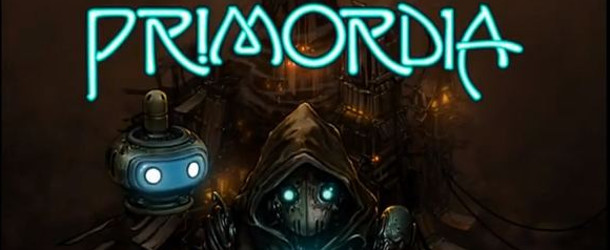 In a post-apocalyptic wasteland, two robots work on rebuilding an ancient relic of Man the Creator. The airship “Uniic” sits in pieces among the sands of the desert as robots Horatio Nullbuilt v5 and Crispin Horatiobuilt v1 finish the final calibrations on the Uniic’s telescope. Without time to celebrate, their ship is rocking, and a giant robot shaped like a floating rectangle with claws breaks in. It shoots Horatio with a laser and steals the ship’s power core. The trail leads to the city of Metropol, and what started off as a search for a power core turns into so much more than Horatio or Crispin ever bargained for.
In a post-apocalyptic wasteland, two robots work on rebuilding an ancient relic of Man the Creator. The airship “Uniic” sits in pieces among the sands of the desert as robots Horatio Nullbuilt v5 and Crispin Horatiobuilt v1 finish the final calibrations on the Uniic’s telescope. Without time to celebrate, their ship is rocking, and a giant robot shaped like a floating rectangle with claws breaks in. It shoots Horatio with a laser and steals the ship’s power core. The trail leads to the city of Metropol, and what started off as a search for a power core turns into so much more than Horatio or Crispin ever bargained for.
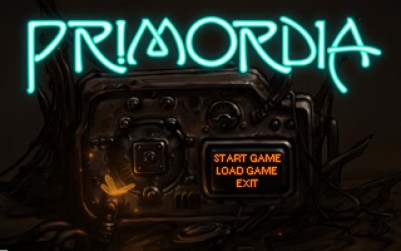 I can’t handle all of these choices!
I can’t handle all of these choices!
Primordia is a point-and-click adventure game, reminiscent of Sierra’s King’s Quest games and countless others. You play Horatio Nullbuilt v5 and Crispin Horatiobuilt v1 as they attempt to find the thief that stole their ship’s power core. Along the way, they reach the robot city of Metropol, the city of light and sound, where they find out that there’s more to their journey than what they originally thought. The story’s interesting, full of intuitive puzzles, and somewhat original. It examines robots in a post human society, showing how they evolve and how they attempt to adapt the way of life that humanity held to their own robotic nature. It is also very well paced, and the multiple endings are very satisfying.
Like many point-and-click adventure games, Primordia is all about puzzles and finding items to solve these puzzles. The items needed to solve the puzzles are usually self-evident, and if not Horatio will offer a simple reason why and possibly suggest a different course of action. Alongside the item-based puzzles, there’s also a logic puzzle, a cypher, a word puzzle based off of symbolism found within one of the in-game texts, and several other puzzle types that defy the genre standard. However, a genre standard that’s maintained is when you’re placed in an obtuse environment looking for something that could be a pixel wide. Combine this with puzzles requiring you to enter in exact number combinations, and ones that are not always so obvious, and you’ve got a mixed bag of some of the best and worst of the genre.
The artwork of the game is beautiful, with 2D character models and prerendered backgrounds. Everything appears alive and distinct, and the animation is consistent and smooth. The environments especially deserve mention here, as even when you’re walking along sand dunes they look beautiful, and the more exotic scenes are breathtaking. Character models are inspired, and I enjoyed seeing the variety of robots that populate Metropol and the Primordia world. And the cutscenes—the cutscenes show off perhaps the ultimate greatness of the art team as they show the characters as they were intended. In all, the game looks beautiful and the art is fantastic.
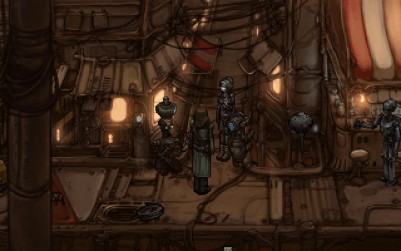 Our hero chats up a gynoid in the Metropol streets.
Our hero chats up a gynoid in the Metropol streets.
The music is also something worth talking about; it is very atmospheric, and usually suits the area you hear it in. It’s something you don’t often notice unless you try, and when it’s not there you do notice. Subtle and atmospheric would be the best way to describe it. An amazing thing about the main theme is that, depending on the ending it can sound hopeful and optimistic, or it can be downright sad depending on which ending you just viewed. Nothing changes about the song, just the endings are full of so much emotion you’ll hear it differently. The music is fantastic, and as much a reason to play the game as anything else.
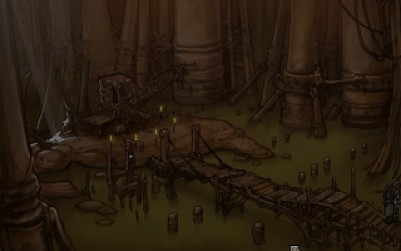 The whole game is brilliant, the end.
The whole game is brilliant, the end.
The only complaint I have is that the robots are gendered. Pretty much all of them have a gender. Which is silly. I guess I can over look that since everything else is pretty fantastic. I just find it unnecessary that even non-humanoid robots feel the need to be “he” or “she”. I mean, the robot that steals your power core has literally no personality, is a flying grey block that says single words to get their point across, and still gets gendered as “he”. Or, how there are robots that are literally computers that take up entire rooms, or are entire factories, or are omnipresent terminals through out the city, and they still get gendered. And while this doesn’t make me not like the game, it’s something that continuously pops into my head when I think about it.
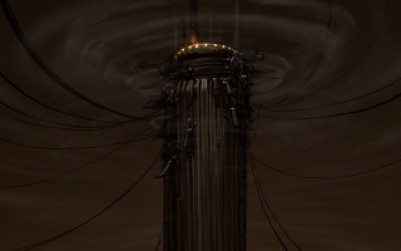 The view from there is spectacular.
The view from there is spectacular.
So, buy this game if you love robots. Buy this game if you love adventure games. I certainly would. Again. I’ve played through it at least six times to get different endings (And once again to get these screenshots). It’s worth your time and money, and I highly recommend it.

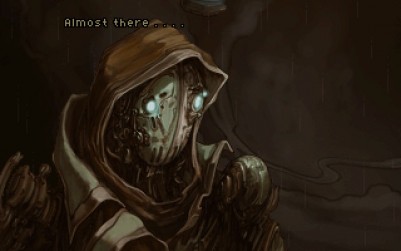
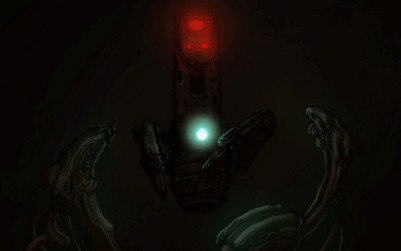
I’d like to direct you to an interview the developer had about your issue with the gendered robots:
http://tap-repeatedly.com/2012/11/a-preview-of-gender-and-diversity-in-primordia/
I don’t really understand what you think the alternative should’ve been. Should the robots have just referred to each other as “they” (or xe/hir, as you prefer to be called, since you believe the robots should also be nonbinary)? Because it’s been established that the masculine pronoun “he” is no longer gender neutral. And while it may have been more politically correct to use “they” instead of gendered pronouns, it would’ve made the writing very clunky, and the story would’ve harder to understand. Especially when you consider those robots that exist as a singular entity formed by a composite of others, like Factor, Memorious, and Goliath.
It also appears to me that a big reason you’d think it’s “silly” for the robots to be gendered is because, quite obviously, they don’t have sexual organs. But isn’t this a narrow-minded viewpoint? As a self-proclaimed gender neutral individual, shouldn’t you be against the mindset that one’s body determines one’s gender?
I don’t think “they” or “xe” is really more clunky than anything else in sci-fi or fantasy. Star Wars had trouble getting funding because producers thought terms like “Darth” and “Jedi” were too weird, but noone bats an eye at jokes about Padawans these days. I feel like it would have been worth an attempt to explore terminology a bit. Maybe robots would have come up with their own terms, that far in the future. The writers could have come up with something creative.
You can like things that have problems. It’s just best to acknowledge the problems and enjoy the media in spite of them.
Okay, one: Not all nonbinary people are xe/hir pronouns.
Two: No, /all/ robots shouldn’t be nonbinary.
Three: No, singular they would not be clunky, we use it all the time.
Four: This isn’t about “Well they don’t have sexual organs!” it’s about, “Well, they’re robots that lack a body which conforms to any human standard ever.” Like, Scraper Sturnweilerbuilt is barely sapient, is a /literal rectangle/ and still is gendered as “he.” Memorious Manbuilt exists without a singular body and is referred to as “she.” Momento Moribuilt is a /hologram/ and is also a “she.” Factor Manbuilt is a factory, playing the role of mother and father to countless robots and is a “he.” Like, all of these robots have no reason to identify as male or female because they’re transcending humanity’s concepts and aesthetics relating to gender.
I can understand Horatio, Clarity/Charity, Metromind, Steeple, Leopold, Arbiter, Crispin even having gender, as well as the Legionbuilt robots having concepts of gender due to their personalities, and roles in society. But, to say that every robot needs to be male or female is binarist considering that robots are one of the very few angles of representation we nonbinary folks get, and even that’s not guaranteed.
I’m not sure what you mean by “binarist,” but I suppose it’s a mean word. I made a lot of assumptions in my reply. Well, since you decided to so nicely divide up your responses, I will do the same.
one: The “or” did not imply there are only three possibilities. People can declare whatever preferred pronouns for themselves that they want, but generally, if someone doesn’t know a gender of a person, or if the person is androgynous, they’re going to use “they.”
two: You did not say or imply this in your article, you only objected to the concept of “all robots” having genders, so it did not occur to me that you were okay with some having genders.
three: Yes, I know we use “they” all the time (just look at my post!), but I was saying that under the assumption that you wanted no robots to have genders. It would be clunky if EVERY character was referred to as “they,” because that’s just confusing at a certain point, but it would be fine if SOME characters were referred to that way.
four: So, it’s about them not having a body that conforms to any human standard. I get that. But I believe my point still stands — if you claim that a person’s gender is independent of their body (which I will not argue with), you shouldn’t be able to logically say “Some of their bodies aren’t indicative of any gender, therefore they should have no gender,” because that would mean that you’re still tying the physical body to the concept of gender, which is contrary to the entire concept of being genderless, am I wrong? Maybe my understanding is limited.
I would also like to address your point of the robots you mentioned “transcending humanity’s concepts and aesthetics relating to gender.” I assume you’ve beaten the game, so [SPOILERS], but all of the robots on the council were built by humans. The other robots were built by robots that were built by humans. Why would they transcend humanity’s concepts when they are, ultimately, linked back to humans? I believe that Factor Manbuilt is referred to as “he” because he was built that way. At no point did he have an opportunity to decide his own gender. Similarly, Crispin is a “he” because Horatio (Horus) decided to build “he” into him. To clarify, I do not object to the concept of genderless robots, but to say that the robots transcend humanity when they were built by humans or robots built by humans is inherently illogical. Even if robots like Factor exceed the capacity of humans, he is still ultimately tied to the personality that the humans programmed him with. Perhaps there are some robots that really are genderless, and simply weren’t referred to with a pronoun at all, but no major characters. I do not object to some major characters being genderless.
You say that you can understand the protagonist, the sidekick of the protagonist, the protagonist’s other best friend that he meets halfway through the game, and the true antagonist (Metromind), having genders. These are basically the biggest main characters in the game. Ever-faithful Leobuilt is also important, but he is basically a priest, which is a traditionally male position (not saying that’s right, but priests are always associated with masculinity). Goliath is a weapon of mass destruction, and of course, men are associated with conquering and dominating. I’m not saying they should be women, and I’m not saying it would be wrong for them to be genderless, but there seems to be clear logic behind their genders, like the developer said in the interview. Would it really to be positive representation for non-binary folks, anyway, to just have them referred by their names all the time instead of a specific gender? People would just assume their gender by their voice anyway. Not saying that’s right, but that’s how it would go. Not sure if you’d played it, but if Spyro the Dragon was always referred to as “Spyro” and never “He,” the players would still refer to Spyro as “he” because Spyro has a masculine voice and society ingrains us with thinking of people as one gender or another, regardless of whether or not it’s right or wrong.
Please feel free to think of me as negatively as you want, but I am only trying to understand your view point. Specifically, I can understand that non-binary people have little representation in media, but how would non-binary characters that are completely irrelevant to the story, or non-binary characters whose gender would be assume anyway, count as positive representation?
I think you summed it up pretty well with “society ingrains us with thinking of people as one gender or another”… Society already enforces genders enough. If every piece of media that “could” have a non-binary character actually DID, even if it was a minor character, people would eventually stop thinking it was such a weird and crazy and unnecessary thing.
Most of your arguments also seem to ignore the fact that non-binary people exist and also play games. It’s like defending “this movie takes place in Europe; there’s no need to have any black characters,” while ignoring that real, living people of color will likely also be watching and might enjoy some inclusion. There’s already a decent suspension of disbelief to say there’s a future world full of intelligent robots. When non-binary people exist in real life, I don’t think it’s such an incredible stretch of the imagination to have at least minor representation of something that exists in reality.
I don’t know. Not trying to say you’re a bad person or something. Most people who comment don’t come back, so it’s cool to see you again. I’m just trying to explain why I think inclusion is important.
I don’t see where I’m ignoring these facts you’re talking about, but I guess I’ll take your word for it.
I would also like to point out that I said, at least a couple times, that I am perfectly fine with some of the robots being non-binary or genderless or whatever (again, in my original post, I thought the author wanted zero gendered robots in the game), so comparing what I said to “there should be no black people in a European movie” is a bit of a strawman.
I also have to restate that just because a gender isn’t stated for a character/robot doesn’t mean people won’t assume that it is genderless/non-binary. The writers would specifically have to say “Look! This robot is neither male nor female!” in some way, which, while isn’t bad, wouldn’t make a whole lot of sense in a game where the extent of gender is determined by programming. I don’t think the characters would care about it nearly as much as we would.
I’m not saying there shouldn’t be more representation, I am just at a loss for how representation would be artfully, subtly achieved in this specific game. Not in general.
To start with your point two: Yes, I objected to “all” robots having gender, because I would assume that “some” robots would forgo gender entirely, either out of lack of sapience, or feeling that human concepts of gender no longer apply. I did not realize I had to outright state that and will be certain to next time someone argues this.
On your point three: There are other pronoun options than “they” as you know, and we can easily use those for other neutral robots.
On your point four: Okay, so for starts, [Spoilers] there are plenty of real nonbinary people, you’re arguing against nonbinary representation with one, and if I could program a robot I’d definitely program it to not adhere to human gender concepts. I’m sure that there are other nonbinary people out there actively pursuing robotics and artificial intelligence, so what’s so farfetched about a future with robots that were programmed by nonbinary people?
Factor Manbuilt is a robotic factory, playing the role of father and mother to countless robots. Having a body and role in society that transcends humanity, and being sapient enough to understand gender and gender roles, Factor would probably consider gender to be silly. In the narrative, Factor is even presented as having a rather alien and detached mind when their plan to beat Metromind is to enter sleep mode and wait until Metropol collapses. It’s established that these robots are sapient, or else possess the fuzzy logic required to make decisions that sapient beings can without requiring an update from an external being, so Factor would probably come to a realization that human gender is silly for a being that performs roles associated with both genders and so many more.
Memorious had no single body, and existed as a stream of data accessible by many consoles. With no aesthetics at all and a personality dedicated to the preservation of facts and truth, I feel like Memorious would be unable to assign themself a gender thinking that it would be somehow untruthful to adopt a gender designation with no data to confirm which one would be more truthful.
I can understand Horatio, Crispin, Metromind, Clarity, and other robots having gender. I’d understand Horatio being gendered because it would be draining to constantly deal with a main character that does not adhere to a mindset people are familiar with. His motives and feelings would be difficult to understand if Horatio had the mentality of a super destroyer like Horus that ultimately sacrificed its own life because it could not reason around its programming to defend humans. As well, Horatio is a Humanist and it would be understandable that he would attempt to emulate humanity and adopt a gender he feels comfortable with. As well, Horatio’s Humanist tendencies are probably reflected in Crispin having gender. Metromind fashions herself a mother of the city Metropol, so it makes sense she’d be gendered female, adopting a female gender role and all. Clarity as well, takes on the role of blind justice, and her character design even reminds us of the iconic statues.
Everfaithful, Leopold, and Steeple all would be similar to Horatio in that their adherence to the Humanist religion would have them identify as male, because of the tradition that priests are male.
However, Goliath could be presented as a female robot easily, as the world’s largest empire was headed by a woman. Alternatively Goliath could be gender neutral for having three different identities inside their body.
However, thank you for mentioning Spiro the Dragon, because that makes me want to play through the earlier games and see if you’re right and if so that’s going to inspire a new article.
Nonbinary side characters would be good representation because, “Oh my god, we’re in this game! Someone believes we exist and put us into a videogame!” It’s a Small Victory, and right now the fight for transequality is built off of Small Victories.